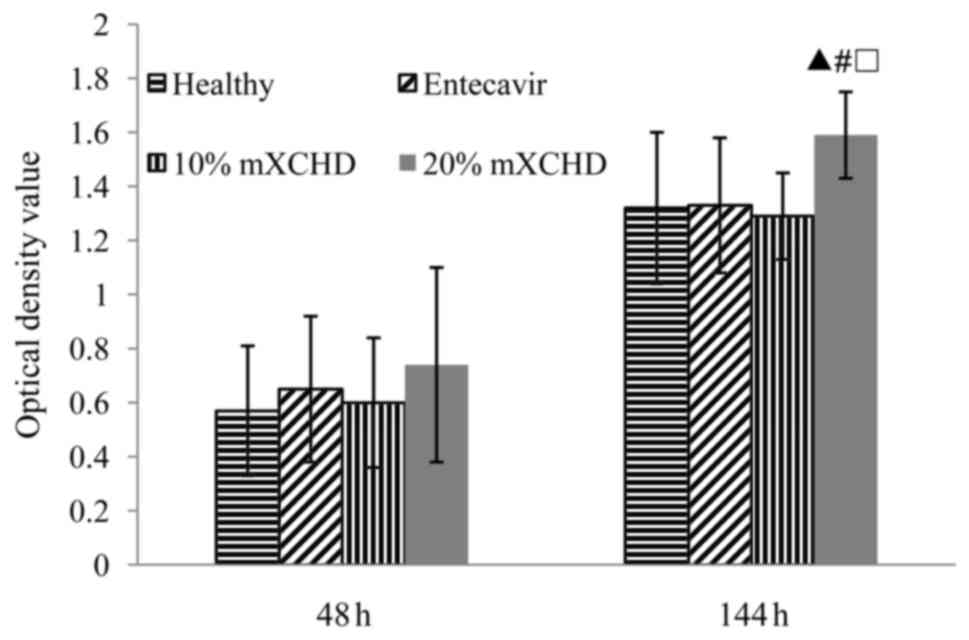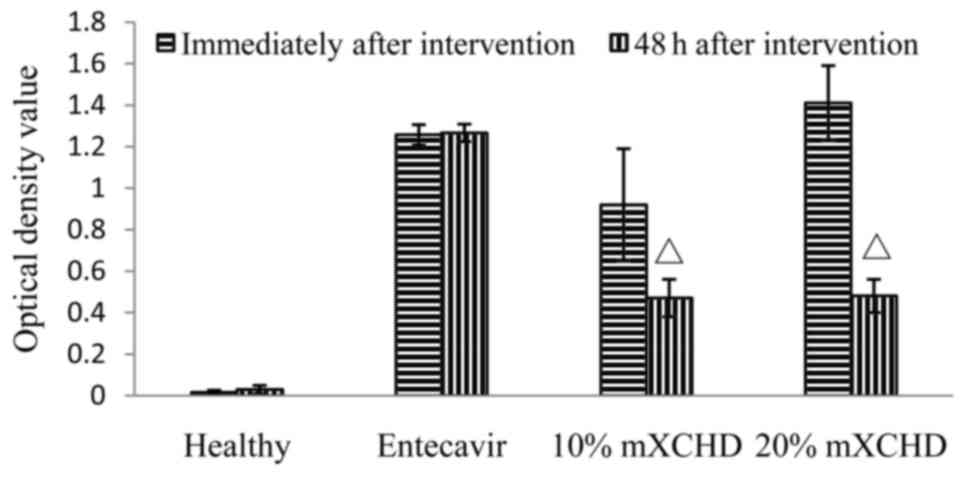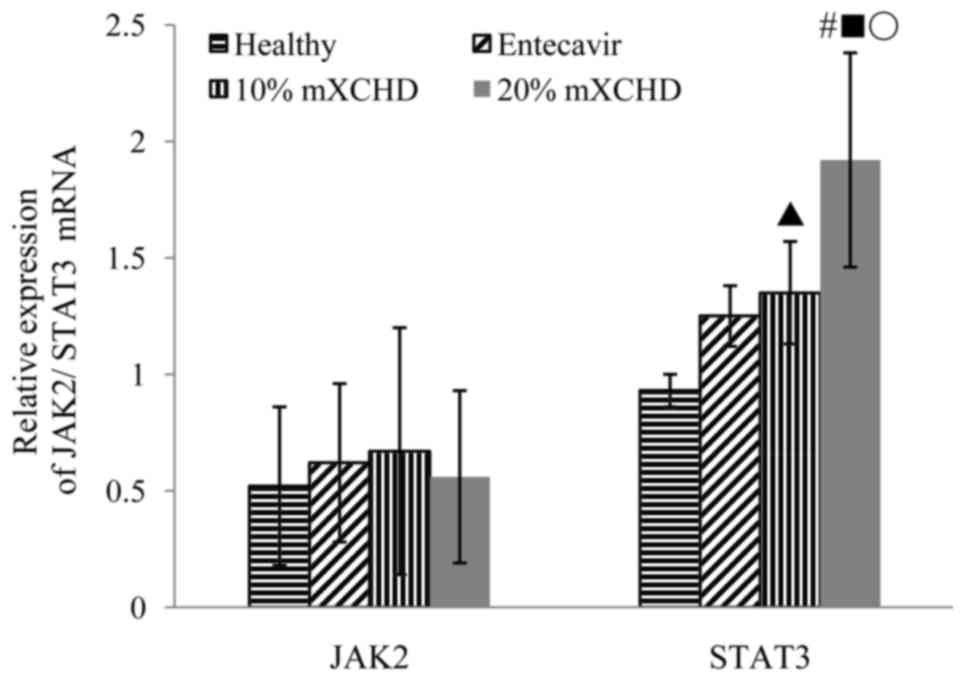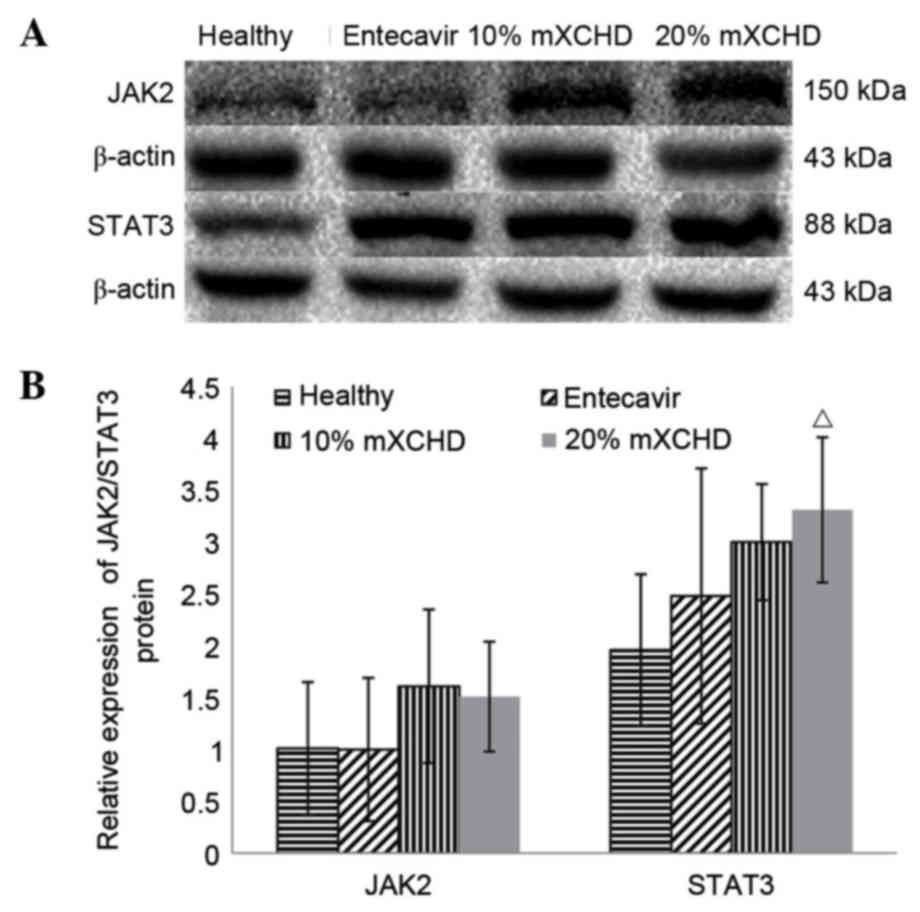|
1
|
World Health Organization: Guidelines for
the prevention, care and treatment of persons with chronic
hepatitis B infection. Geneva: WHO. 1–11. 2015.
|
|
2
|
Varbobitis I and Papatheodoridis GV: The
assessment of hepatocellular carcinoma risk in patients with
chronic hepatitis B under antiviral therapy. Clin Mol Hepatol.
22:319–326. 2016. View Article : Google Scholar : PubMed/NCBI
|
|
3
|
Intaraprasong P, Siramolpiwat S and
Vilaichone RK: Advances in management of hepatocellular carcinoma.
Asian Pac J Cancer Prev. 17:3697–3703. 2016.PubMed/NCBI
|
|
4
|
Liaw YF, Kao JH, Piratvisuth T, Chan HL,
Chien RN, Liu CJ, Gane E, Locarnini S, Lim SG, Han KH, et al:
Asian-Pacific consensus statement on the management of chronic
hepatitis B: A 2012 update. Hepatol Int. 6:531–561. 2012.
View Article : Google Scholar : PubMed/NCBI
|
|
5
|
Tsai MC, Chen CH, Hu TH, Lu SN, Lee CM,
Wang JH and Hung CH: Long-term outcomes of hepatitis B
virus-related cirrhosis treated with nucleos (t)ide analogs. J
Formos Med Assoc. 115:883–889. 2016.PubMed/NCBI
|
|
6
|
Qin XK, Li P, Han M and Liu JP: Xiaochaihu
Tang for treatment of chronic hepatitis B: A systematic review of
randomized trials. Zhong Xi Yi Jie He Xue Bao. 8:312–320. 2010.(In
Chinese). View Article : Google Scholar : PubMed/NCBI
|
|
7
|
Zhao F, An LF, Ma YQ and Yang KF: Efficacy
of singly Chinese herbal drugs for hepatitis B virus in vitro and
in vivo: A systematic review. Chinese Traditional Patent Medicine
(Chin). 37:2282–2285. 2015.(In Chinese).
|
|
8
|
Bai Y, Xia FN, Zhou SH, Yu KH and Liu JH:
Regulating effect of traditional Chinese medicines for Enh II and
core promoter of hepatitis B virus. Lishizhen Medicine and Materia
medica Research (Chin). 26:1534–1536. 2015.(In Chinese).
|
|
9
|
Wang Y: Effect of Xiaochaihu decoction
combined with western medicine on liver function and HBV DNA copies
in patient with chronic hepatitis B. Journal of New Chinese
Medicine (Chin). 48:74–76. 2016.(In Chinese).
|
|
10
|
Chen DD and Gong ZJ: The clinical study of
Xiaochaihu decoction in treatment of chronic hepatitis B patients
with liver fibrosis. Modern Journal of Integrated Traditional
Chinese and Western Medicine (Chin). 20:3928–3929. 2011.(In
Chinese).
|
|
11
|
Zhao CH: Clinical observation on 40 cases
of HBeAg-positive chronic hepatitis B treated with modified
Xiaochaihu decoction combined with adefovior. Henan Traditional
Chinese Medicine (Chin). 34:1924–1925. 2014.(In Chinese).
|
|
12
|
Wang MH, Zheng DR and Cheng Q: Clinical
Research of modified Xiaochaihu decoction combined with adefovior
in treatment of chronic hepatitis B patients. Journal of Community
Medicine (Chin). 12:30–31. 2014.(In Chinese).
|
|
13
|
Xiao-qiu Liu, Xiao-jian Hu, Hong-Xing Xu
and Xiao-Ying Zeng: Xiaochaihu decoction attenuates the vicious
circle between the oxidative stress and the ALP inactivation
through LPS-catecholamines interactions in gut, liver and brain
during CCI4+ethanol-induced mouse HCC. BMC Complement
Altern Med. 13:3752013. View Article : Google Scholar : PubMed/NCBI
|
|
14
|
Liu XB, Wang J, Zhang QQ, Liu T, Dang TM
and Cao YM: The protective effect of XD in ConA-induced liver
injury. Xi Bao Yu Fen Zi Mian Yi Xue Za Zhi. 26:1193–1194. 2010.(In
Chinese). PubMed/NCBI
|
|
15
|
Li J, Xie M and Gan Y: Effect of
Xiaochaihu decoction and different herbal formulation of component
on inhibiting H22 liver cancer in mice and enhancing immune
function. Zhongguo Zhong Yao Za Zhi. 33:1039–1044. 2008.(In
Chinese). PubMed/NCBI
|
|
16
|
Sun MY, Xie M, Zhang N, Yi L and Wang S:
Effect of xiaochaihu decoction and different herbal formulations of
its components on cytokines of carrageenan induced pleuritis in
rats. Zhongguo Zhong Xi Yi Jie He Za Zhi (Chin). 24:628–631.
2004.(In Chinese).
|
|
17
|
Liu Z, Xiong M and Zhang H: Experimental
study on inhibitory effect of xiaochaihu decoction on duck
hepatitis B virus. Zhongguo Zhong Xi Yi Jie He Za Zhi. 20:853–855.
2000.(In Chinese). PubMed/NCBI
|
|
18
|
Sun XH, Wang ZL and Liu ZJ: Effect of
modified Xiaochaihu decoction on HBV-DNA levels in sera and liver
tissue in transgenic mice. Chinese Journal of Integrated
Traditional and Western Medicine on Digestion (Chin). 19:91–93.
2011.(In Chinese).
|
|
19
|
Chinese Society of Hepatology and Chinese
Society of Infectious Diseases, Chinese Medical Association: The
guideline of prevention and treatment for chronic hepatis B (2010
version). Zhonghua Gan Zang Bing Za Zhi. 19:13–24. 2011.(In
Chinese). PubMed/NCBI
|
|
20
|
The Internal Medicine Department Committee
of Liver Disease in Chinese Traditional Chinese Medicine
Association: TCM syndrome differentiation standards of Viral
hepatitis (Trial). Journal of Traditional Chinese Medicine (Chin).
5:39–40. 1992.(In Chinese).
|
|
21
|
World Medical Association: World Medical
Association Declaration of Helsinki: Ethical principles for medical
research involving human subjects. JAMA. 310:2191–2194. 2013.
View Article : Google Scholar : PubMed/NCBI
|
|
22
|
Chinese Pharmacopoeia Commission:
Pharmacopoeia of the People's Republic of China (volume 4, 2015
version). Beijing: China Medical Science Press; pp. 7–151. 2015,
(In Chinese).
|
|
23
|
Livak KJ and Schmittgen TD: Analysis of
relative gene expression data using real-time quantitative PCR and
the 2(-Delta Delta C (T)) method. Methods. 25:402–408. 2001.
View Article : Google Scholar : PubMed/NCBI
|
|
24
|
Boucle S, Bassit L, Ehteshami M and
Schinazi RF: Toward elimination of Hepatitis B virus using novel
drugs, approaches and combined modalities. Clin Liver Dis.
20:737–749. 2016. View Article : Google Scholar : PubMed/NCBI
|
|
25
|
Jeng WJ, Chen YC, Sheen IS, Lin CL, Hu TH,
Chien RN and Liaw YF: Clinical relapse after cessation of tenofovir
therapy in Hepatitis B e antigen-negative patients. Clin
Gastroenterol Hepatol. 14:1813–1820. 2016. View Article : Google Scholar : PubMed/NCBI
|
|
26
|
Xia J, Inagaki Y, Song P, Sawakami T,
Kokudo N, Hasegawa K, Sakamoto Y and Tang W: Advance in studies on
traditional Chinese medicines to treat infection with the hepatitis
B virus and hepatitis C virus. Biosci Trends. 10:327–336. 2016.
View Article : Google Scholar : PubMed/NCBI
|
|
27
|
Xiong MQ, Wang QG, Guan QZ, et al: Science
of Exogenous Febrile Diseases. Beijing: China Press of Traditional
Chinese Medicine; pp. 263–272. 2003, (In Chinese).
|
|
28
|
Gu JP, Wang CL, Zhang FF, et al:
Pharmacology of Traditional Chinese Medicine. Shanghai: East China
University of Science and Technology Press; pp. 110–229. 2015, (In
Chinese).
|
|
29
|
Li L, Lei QS, Zhang SJ, Kong LN and Qin B:
Suppression of USP18 potentiates the anti-HBV activity of
interferon Alpha in HepG2.2.15 cells via JAK/STAT signaling. PLoS
One. 11:e01564962016. View Article : Google Scholar : PubMed/NCBI
|
|
30
|
Zhu X, Xie C, Li YM, Huang ZL, Zhao QY, Hu
ZX, Wang PP, Gu YR, Gao ZL and Peng L: TMEM2 inhibits hepatitis B
virus infection in HepG2 and HepG2.2.15 cells by activating the
JAK-STAT signaling pathway. Cell Death Dis. 7:e22392016. View Article : Google Scholar : PubMed/NCBI
|
|
31
|
Guan SH, Yang K, Lu MJ, Lu YP and Yang DL:
The influence of HBV and its antigens on the expressions of
JAK-STAT signal transduction pathway molecules and antiviral
proteins of IFN alpha. Zhonghua Gan Zang Bing Za Zhi. 19:440–444.
2011.(In Chinese). PubMed/NCBI
|
|
32
|
Bock CT, Toan NL, Koeberlein B, Song le H,
Chin R, Zentgraf H, Kandolf R and Torresi J: Subcellular
mislocalization of mutant hepatitis B X proteins contributes to
modulation of STAT/SOCS signaling in hepatocellular carcinoma.
Intervirology. 51:432–443. 2008. View Article : Google Scholar : PubMed/NCBI
|
|
33
|
Churin Y, Roderfeld M, Stiefel J, Würger
T, Schröder D, Matono T, Mollenkopf HJ, Montalbano R, Pompaiah M,
Reifenberg K, et al: Correction: Pathological impact of hepatitis B
virus surface proteins on the liver is associated with the host
genetic background. PLoS One. 10:e01273752015. View Article : Google Scholar : PubMed/NCBI
|
|
34
|
Li W, Liang X, Kellendonk C, Poli V and
Taub R: STAT3 contributes to the mitogenic response of hepatocytes
during liver regeneration. J Biol Chem. 277:28411–28417. 2002.
View Article : Google Scholar : PubMed/NCBI
|
|
35
|
Schwabe RF, Bradham CA, Uehara T, Hatano
E, Bennett BL, Schoonhoven R and Brenner DA: c-Jun-N-terminal
kinase drives cyclin D1 expression and proliferation during liver
regeneration. Hepatology. 37:824–832. 2003. View Article : Google Scholar : PubMed/NCBI
|
|
36
|
Chen XL, Meng Q and Liu KX: Role of STAT3
signaling pathway in repair of liver injury. World Chinese Journal
of Digestology (Chin). 22:1051–1057. 2014.(In Chinese). View Article : Google Scholar
|


















